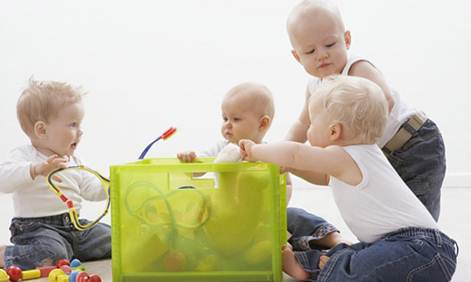Babies at this age still think the whole world revolves
around them, so they need to be taught immediately.
Share?
This scene may be familiar with you. Watching your child and
a group of children playing, you realize that your baby is focusing on his toy.
Another kid suddenly wants your baby’s toy and spring up to grab it.
Consequently, a fight begins. Your baby gets angry and asks you for help. You
and other parents quickly come to appease “Let’s share!”
Children at this age still think that the world revolves
around them. They always believe that their parents only notice and take care
of them. In addition, their ‘coordinating skill’ – ‘play together, happy
together’ is not formed, so they don’t know what is sharing.
However, it doesn’t mean that every word parents talk with
the baby is useless. Be patient to teach him how to share since this age to
make him have good moral ‘platform’ when he grows up.

Babies at this age
still think the whole world revolves around them, so they need to be taught
immediately.
Play together
Before being able to walk and explore every nooks and
crannies, the baby will learn how to sit and observe other people. Although
some children don’t directly take part in playing with other kids, they are
interested in watching and then applauding or surprising. It is a special kind
of playing.
After learning how to sit and use fingers more cleverly, the
baby will enter the next stage of development that is ‘playing together’.
Although children don’t play, when they sit beside each other, they still learn
how to interact with toys, talk (alone) and study idea of their friends.
Development milestones of each baby are different. There are
children who like playing and being active but there are also ones who silently
observe. Thus, don’t force your baby to play with their friends soon. Let them
naturally change from playing beside each other to playing together and
understand how is sharing and negotiating.
Walk?
Many parents sign with relief when they see their children
walking the first steps. Walking time of each baby is different. There are
10-month children who can step proficiently, but there are babies toddling till
16 or 17 months. Also, though your baby knows how to walk at which age, are
there some relatives and friends who don’t recommend wearing shoes for your
baby?
In this case, some experts advise you to let your baby get
familiar with shoes as soon as he leans on furniture and walks the first steps.
It is essential that you need to look for shoes with soft soles to keep his
feet steady and avoid slippery. If there are weather support and good
environment, let him to walk on his bare feet to feel the ground and strengthen
his leg muscles.
In addition, most parents buy shoes before their children
need them. It’s hard to resist it because shoes for babies are too cute.
However, please remember that your baby’s feet may increase one size after 6
weeks.

Many parents sign with relief when they see their children walking the first
steps.
Arranging and sorting games
If you used to put a cloth basket in front of your children
or observe them playing with plastic blocks or colorful spoons that you still
had to show them every meals, you would have found that they were absorbed in
an old game.
At this age, he was attracted by games taking stuff out,
comparing the size, shape, sorting them and then leaving them at the original
position (this stage is rarely conducted and sadly, it also continues later for
a long time).
If you don’t want your baby to play with clean clothes or
pots that makes annoying noises, you can buy or make proper toys for them to
play stacking or sorting games in order to satisfy the baby’s preferences.
Therefore, you can have few precious minutes to have a cup of coffee – It’s
truly killing two birds with one arrow.
Vaccinated or not?
On the next physical examination, your baby will be offered
varicella vaccine. This vaccine will protect him form a disease that many of us
are still scared,
Many parents would wonder whether let your baby recover
himself and there will be antibody after that, or inject vaccine to prevent the
disease. It is a complicated matter and the last decision depends on the
straightforward discussion of you and your baby’s doctor.
It is essential to prefer and remember the vaccination
calendar to ensure that your baby doesn’t miss any important injection.